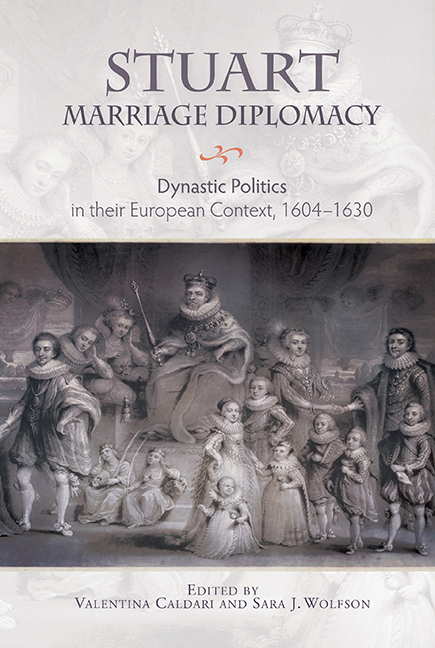Book contents
- Frontmatter
- Contents
- List of Illustrations
- List of Contributors
- Acknowledgements
- List of Abbreviations
- Introduction
- Part One Marriage and the Court
- Part Two Marriage and Politics
- 4 ‘The onely soveraigne medecine’: Religious Politics and Political Culture in the British–Spanish Match, 1596–1625
- 5 James I and the Dissolution of the 1621 Parliament through Spanish Eyes
- 6 War, Diplomacy and Stability in the North of Europe in the Early Seventeenth Century
- 7 The Atlantic Politics of Early Stuart Diplomacy
- 8 Mercantile Diplomacy: Corporations, States and International Negotiation
- Part Three Marriage and War
- Part Four Marriage and News
- Part Five Marriage and Continental Europe
- Part Six Marriage and Ceremony
- Bibliography
- Index
- Studies in Early Modern Cultural, Political and Social History
7 - The Atlantic Politics of Early Stuart Diplomacy
from Part Two - Marriage and Politics
Published online by Cambridge University Press: 24 October 2019
- Frontmatter
- Contents
- List of Illustrations
- List of Contributors
- Acknowledgements
- List of Abbreviations
- Introduction
- Part One Marriage and the Court
- Part Two Marriage and Politics
- 4 ‘The onely soveraigne medecine’: Religious Politics and Political Culture in the British–Spanish Match, 1596–1625
- 5 James I and the Dissolution of the 1621 Parliament through Spanish Eyes
- 6 War, Diplomacy and Stability in the North of Europe in the Early Seventeenth Century
- 7 The Atlantic Politics of Early Stuart Diplomacy
- 8 Mercantile Diplomacy: Corporations, States and International Negotiation
- Part Three Marriage and War
- Part Four Marriage and News
- Part Five Marriage and Continental Europe
- Part Six Marriage and Ceremony
- Bibliography
- Index
- Studies in Early Modern Cultural, Political and Social History
Summary
For most of his reign, James I's foreign policy served two goals: to maintain peace within Europe's borders while pursuing trade and territories in the Atlantic and beyond. These two goals were often in tension. James I's imperial aspirations in the Atlantic brought him frequently into conflict with newly allied Spain, whose exclusive claim over this space prohibited English encroachment. The Jacobean government's imperial interests were shared by the governments of France and the United Provinces, who too vied for access and influence in the Americas. As Europe's imperial contest intensified, Jacobean continental diplomacy became deeply entangled in Atlantic politics and imperial rivalries. During periods of conflict, particularly in the 1610s, Jacobean diplomats in Spain and France were responsible for advancing James's Atlantic agenda while simultaneously softening tensions caused by Atlantic disputes.
This chapter will examine two case studies that demonstrate the different ways in which English diplomats in Spain and France negotiated Atlantic imperial rivalries. The first example will explore the intelligence practices employed by English and Spanish diplomats to navigate tensions over the settlement of the English colony of Virginia. In order to become better informed of Spanish military plans for Virginia, James I ordered English diplomats to intensify their intelligence operations in Spain. Ambassadors cultivated intelligence agents, who intercepted correspondence, decoded Spanish ciphers, monitored naval preparations, and tracked the movements of the West Indies fleet. By improving his intelligence capabilities, James I hoped to match Philip's III's superior intelligence programme, which yielded significant intelligence about Virginia. In 1612 Philip sent an Extraordinary Ambassador, Don Pedro de Zuniga, to London, under the guise of discussing European marriage negotiations, in order to gain intelligence on the Virginia colony. Aware of this covert operation, Sir John Digby, the English ambassador to Spain, deployed his best intelligence resources to identify Zuniga's orders and any intelligence he gathered in England. This example demonstrates the many ways Atlantic competition complicated and informed European relations and the critical role diplomats played as intelligence agents in this imperial contest.
The second case study examines the diplomatic inquiry into the English attack on a French settlement in Acadia. The patent for this Acadian territory, which Virginia colonists believed conflicted with their own patent, tested the limits of a shared understanding of each state's imperial boundaries.
- Type
- Chapter
- Information
- Stuart Marriage DiplomacyDynastic Politics in their European Context, 1604–1630, pp. 109 - 124Publisher: Boydell & BrewerPrint publication year: 2018

